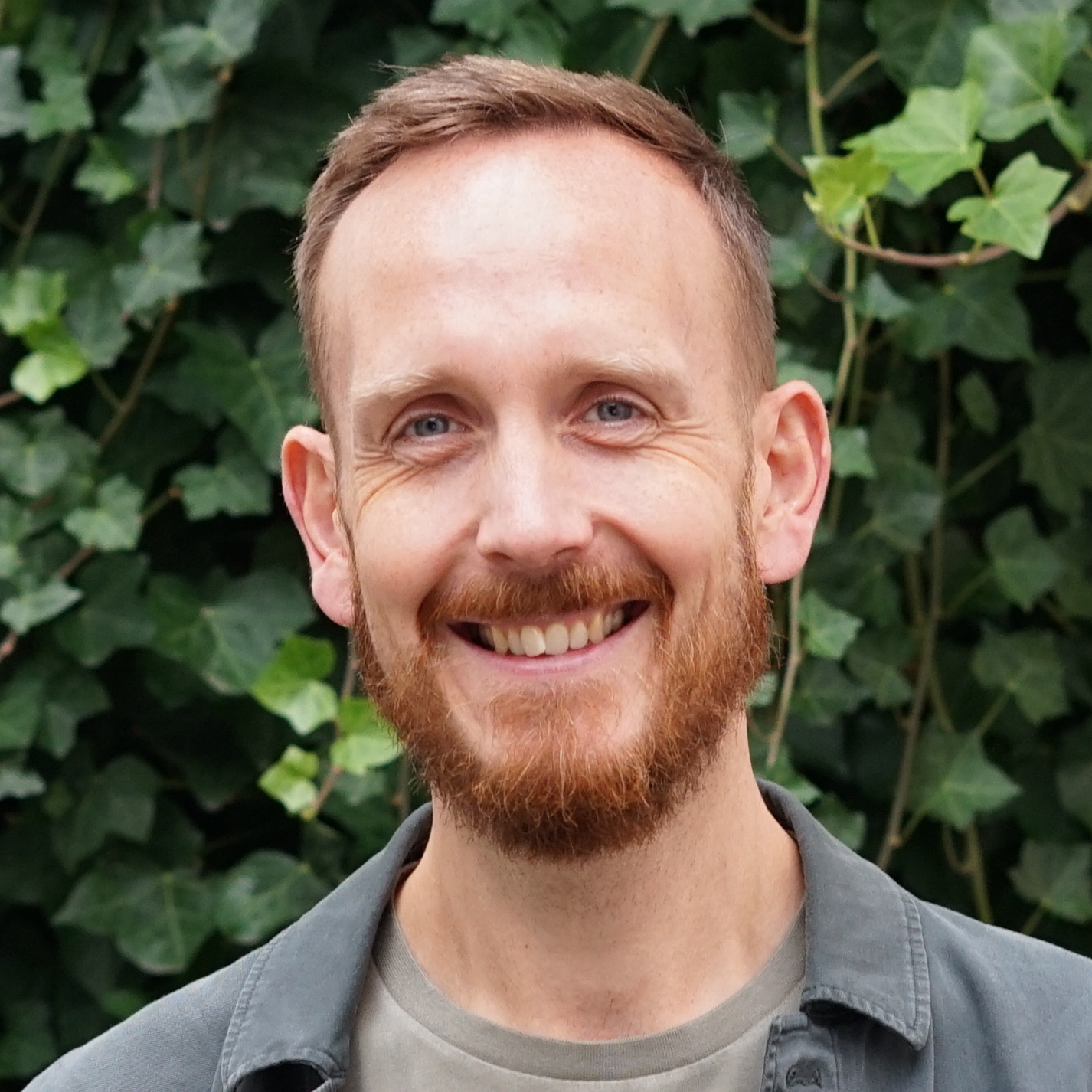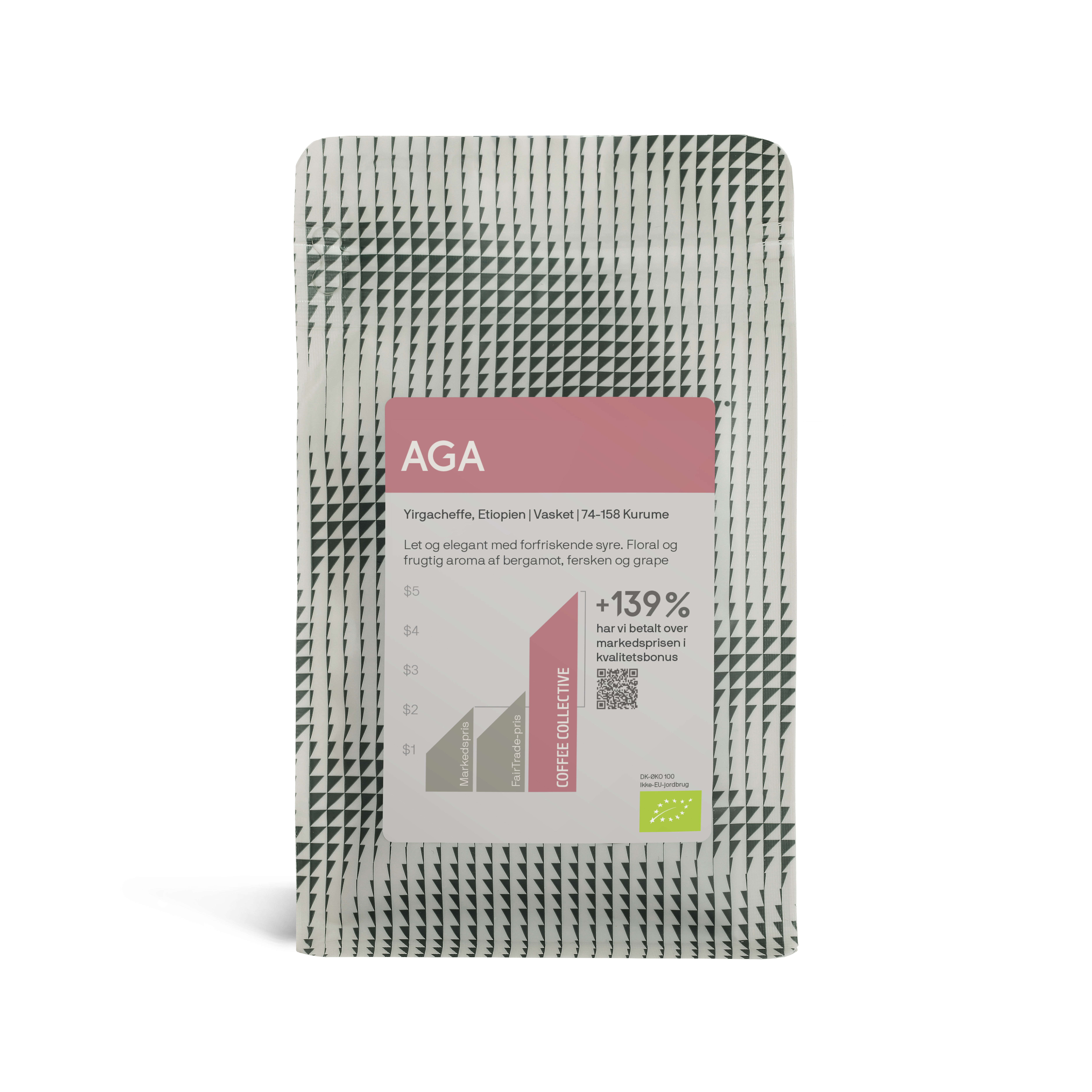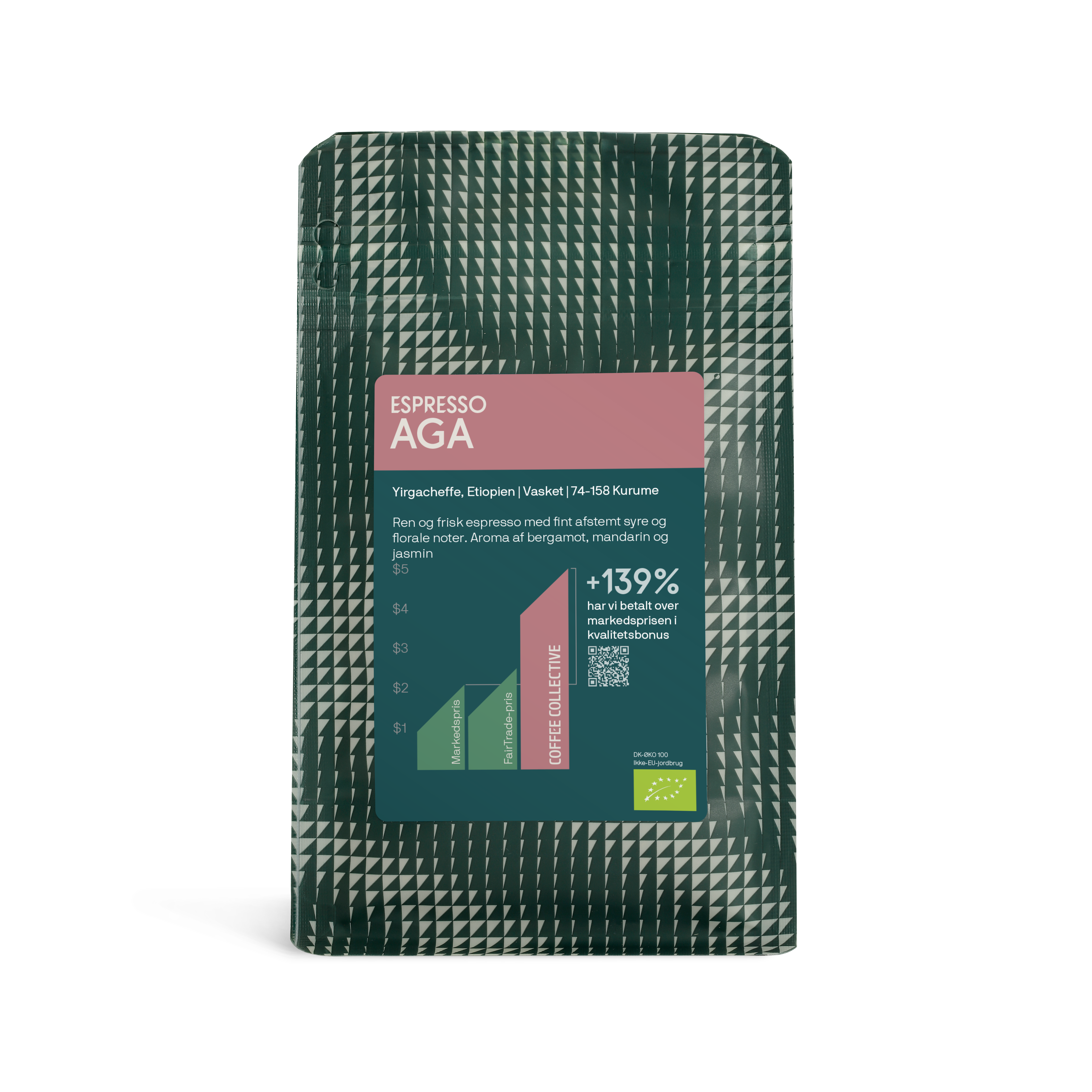As part of our commitment to the producers we work with, we promise to visit them every year and this year was no exception. Casper Engel Rasmussen is responsible for our Ethiopian sourcing through the last 14 years, and on this trip, he also brought our manager at Carlsberg Byen, Zewdie Redda and myself, Klaus Thomsen.
It has been 12 years since my last visit to Ethiopia and things have changed so much. Addis Ababa is now a modernized big city; roads everywhere are smoothly tarmacked and overall, I sensed a lot of development. But as you venture further into the most rural areas, you can still tell how little money is present and how our business there can be a force for more development and growth for people who need it the most.
We arrived at Addis Ababa early Sunday morning and headed straight for a cupping session with our friend Moata, who facilitates our direct purchases with each of the farmers we work with. It’s still the beginning of the harvest, but we got to taste some promising coffees and a special Lactic Fermentation from a neighbor to one of the farmers we already work with. Very exciting.
Later same day we flew down to Hawassa and drove (after a car break-down, and changing vehicles 4 times) with Degefu Mulugeta, or Dege for short, to the Mulugeta drying station.
Washing stations, drying stations, wet mill, factories – so many names for what can essentially be the same thing.
This is where coffee is collected and processed, and depending on region and types of processing you’ll hear different designations used. At Mulugeta they mostly process coffee as Naturals and some Anaerobic Naturals, so they referred to is as a Drying Station. However, they do also make a washed process (which taste phenomenal too) so all terms are technically correct.
The name “Mulugeta” is what we’re calling this coffee, as the drying station itself doesn’t really have a name. Mulugeta Muntasha is the name of the owner – the father of Dege, whose last name is the first name of the father as per Ethiopian tradition. We met the father and mother briefly in Hawassa but by now Dege has pretty much taken over the operations. Dege has an education as electronical engineer but is eager to grow and expand the coffee business, both in quality and size.
They are situated in the famous Sidama region, which is known for producing extraordinary coffees, but the small sub-region or area, Arbegone, they are in, is actually quite new to producing coffee. Historically it’s been too high at 2.200 – 2.400 meters above sea level to produce coffee. The trees simply wouldn’t produce cherries, and if they did, they wouldn’t ripen. But with climate change this area is now well suited to produce slow-maturing, complex coffees. They’ve only been producing coffee here for about 5 years.
The Anaerobic process basically just means that there’s a fermentation without the access to air/oxygen. Mulugeta takes the whole cherries and place them in plastic containers with a lid on, and a tube with a water lock to allow the excess carbon dioxide to escape with air getting in. It sits there for 48-60 hours, before it’s taken out to shaded drying tables.
Next day Dege picked us up again and we went to visit Bekele Kachara in the Murago area. Bekele has grown up with coffee production and today runs several drying stations in the area where he works with up to local 75 farmers. He doesn’t speak a word of English but took us around the area and had Moata translate.
Some of the most interesting natural processed coffees we’ve ever tasted.
We are buying coffees from his highest situated drying station at 2.350 masl. At this altitude the drying is super slow, but without any mould or unwanted fermentation occurring. Maybe it’s more dehydrating or maybe it’s the lower oxygen levels, we don’t know for sure. What we do know is that these are some of the most interesting natural processed coffees we’ve ever tasted. The terroir – the Kurume variety, the soil, microclimate – is all very distinguishable in the flavour. You are not just tasting “process” but rather, the natural process, whole cherry drying, seems to accentuate the flavours which just seems so integrated.
Walking around the area, you can tell how rich the soil is and how lush everything seems. Biodiversity is huge and you hardly recognize where the coffee trees are, as they are growing amongst so many other plants, bushes and trees. Some 50 years ago other crops were planted here but now they are re-planting indigenous trees to bring it back to its former state. In between the forest there’s small pastures from cows and goats alongside the traditional huts. Walking paths and fields are fenced off by high cactus plants and at times it feels like walking inside a labyrinth.
We took a good hike around the place, going up and down the hills, visiting some of the farmers and getting to smell the most amazing naturals inside the warehouse. Such a sweet, raisin-like smell of Cascara. And of course, we got to sit down for coffee with Bekele himself and had a great dinner of Injera with him in the evening.
On the third day we ventured further south to Yirgacheffe. For me personally, this felt like my pilgrimage. For as long as I’ve been drinking coffee Yirgacheffe has stood as a beacon of the very best in coffee. Super floral aromatics, citrusy acidity, stonefruit sweetness and mouthfeel and complexity like no other region. So, I was like a kid at Christmas going here to visit the Aga washing station we’ve been working with the last two years.
Aga is named after the founder and owner Habtamu Aga, who runs 5 washing stations in Ethiopia. This one is located between the villages of Worka and Chelbesa. The road there took us up to 2.600 masl, which is much higher than coffee can grow.
For us, it’s super important to be able to pay more for the coffee and ensure that payments go out to the actual growers and isn’t just pocketed by an exporter or miller.
At Aga we were met by the manager, Tolera Temesgen, and his smile and friendly approach immediately made us feel welcome. At Aga they work with 250 farmers in the nearby area, from whom they buy cherries at a higher price than usual. For us, it’s super important to be able to pay more for the coffee and ensure that payments go out to the actual growers and isn’t just pocketed by an exporter or miller. Together with the outstanding cup quality this has been our biggest reason for working with Habtamu Aga – his willingness to support the farmers directly has meant we were able to have full traceability directly to each grower. Something we don’t see any other roasters or buyers getting to the same extend.
We saw most of the processing in action at Aga. The coffee that had been picked the day before and then depulped had fermented over night and was ready for washing. The processing here overall struck me as very similar to what I’ve seen in Kenya, with very careful grading and washing. We enjoyed the washing crew’s singing as they were scrubbing the fermented mucilage off the coffee in the washing channels.
Afterwards the parchment coffee is moved to shaded drying tables and immediately hand sorting begins. It was impressive to see how much the crew would sort out. Women working on one table and men on another. After 2 days on the shaded drying tables the coffee is moved out to open drying tables in the sun for 7-9 days, but from 11 Am to around 2 PM they cover the coffee to protect it from the harsh sunlight. At this point it’s around 10-11% moisture content and moved inside a warehouse, where it’s getting a final resting period to stabilize the humidity content.
Last year Tolera experimented with a doing a Natural process of the coffees from here but found that the quality wasn’t as good as what they can achieve with the washed process. We tend to agree. This is probably the best Yirgacheffe’s we’ve ever tasted, super clean and amazingly floral. It has the classic Yirgacheffe traits of citrus, flowers, peach/stonefruits with a lively, delicate acidity, great sweetness and a lovely mouthfeel. It’s just so perfect the way it’s done that there’s no need to try and manipulate that further in the processing.
Elfinesh Gelgelu
One of the important farmers delivering to Aga is Elfinesh Gelgelu. An older lady, from one of the prominent families in the area. Her family is actually the one who gave Habtamu permission to build the washing station where it is, and they uphold quite the status in the local community. She took us around to see her coffee trees, which was growing in what looked like a wild forest to us.
Elfinesh spoke highly of the farmer training that the local government has provided: “We drank the training like water” she said. Picking only ripe red cherries, they’ll go over the same trees multiple times during the harvest period, which ensure a sweet and aromatic cup profile.
7 or 8 years ago they experienced frost on the farm – the high altitude makes this a big risk.
A single frost can completely kill the coffee trees and ruin the entire harvest. She lost most of her income that year (just imagine you’d lose most of your yearly salary in a night!) but fortunately she has diversified her crops, and could sustain her family with income from other produce, like False Banana – a tree that looks like banana trees, bit doesn’t bear any fruit – instead the bark can be fermented and cooked. After that year many people in the area uprooted their coffee trees, but not Elfinesh. She stumped her trees (pruning it down to just above the roots) after the frost and allowed 4-5 stems to grow. Now they are bearing fruit again. In general, there’s little to no pruning done on the coffee trees here. It could certainly increase the yields from each tree if they did, but perhaps this is one of the reasons why this coffee tastes so amazing.
Reshad
After another day of travelling, we went out to Jimma region, south-west of Addis, to meet up with Reshad Albus.
Reshad is a coffee farmer with a mid-size drying station and is working with around 24 local farmers in the neighboring area. While the harvest we saw in Yirgacheffe was just beginning, here in Jimma it’s almost over at this point when we visited. As we walked around Reshads farm and to some of his neighbours, we saw only a few ripe cherries left on the trees, while the drying tables at the mill was quite full.
His farm and washing station are situated near Agaro town and close to the village Goma. It’s quite far out in the countryside on bumpy and muddy dirt roads, but the hilly landscape and serene environment is just beautiful.
On the drying tables we inspected the fresh harvest and enjoyed the raisin-like scent of the natural processed coffee. Meanwhile the crew were busy sorting out lower quality and turning the coffee around to ensure even drying. There are 6 permanent workers on the farm and mill but an additional 37 employees during the harvest and drying season.
In this area you find a mix of natural varieties – heirloom or landrace, as they’re often referred to. These are coffee trees that have cross-pollinated for centuries, and that natural variation most likely is part of the complex flavour profile.
The soil is covered with leaves which will turn into mulch to both bring nutrients to the soil, but more importantly to keep the soil moist. They can get heavy rains at times here, but it’s really important that all the water doesn’t just evaporate too quickly, and mulching helps for that. In general, there’s an abundance of other trees, giving shade and habitat for birds and insects, and it’s very clear how the coffee is grown in harmony with nature rather than exploitation.
Reshad is in his 30ies with three kids aged 16, 12 and 3. He says he would love for them to take over the farm one day but also stresses that education is the most important thing for him.
This year he is working on getting organic certification, which we will help pay for. He told us he’s very happy with the prices he’s getting for his coffee, and that we at Coffee Collective pay better than anyone else. In the past he used to deliver coffee to and helped manage a cooperative, which was just a way to sustain life and put his kids to school. Now, being a private farmer, he can have a thriving business and look into a better future for himself and his kids.
Dry Mill and leaving Addis
We wrapped up our trip back in Addis Ababa where we visited a very large, new Dry Mill that is being constructed in the outskirts of the city by Habtamu Aga. The buildings are there and all the machinery – hullers, size sorters, density tables, electronic eye, packaging machines and so on – are ordered and on the way. Hopefully this will already be operational before New Year. It is hard to imagine right now, but progress in Ethiopia is going much faster than it used to.
You might also like
Would you like to get our different coffees delivered directly to your doorstep? We've got you covered.
Address
Coffee Collective
Godthåbsvej 34B
2000 Frederiksberg
CVR: 30706595
Contact
mail@coffeecollective.dk
+45 60 15 15 25 (09.00-15.00)
Coffee and cookies
This site uses cookies.
Find out more on how we use cookies.





















